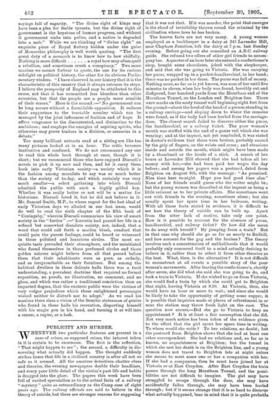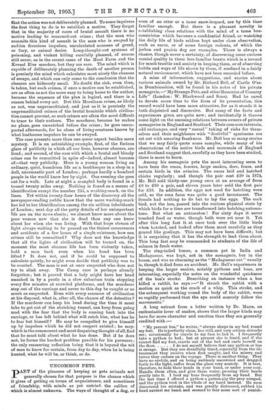The known facts are not very many. A young •
woman employed as a bookkeeper in a dairy at 245 Lavender Hill, near Clapham Junction, left the dairy at 7 p.m. last Sunday evening. Before going out she consulted an A.B.C. railway guide. She refused two offers of other girl friends to accom- pany her. A quarterof an hour later she entered a confectioner's shop, bought some chocolates, joked with the shopkeeper, and said that she was going to Victoria. She was carrying her purse, wrapped up in a pocket-handkerchief, in her hand; there was no pocket in her dress. The purse was full of money. Nothing more, so far as is yet known, was seen of her until five minutes to eleven, when her body was found, horribly cut and disfigured, four hundred yards from the Merstham end of the Merstham Tunnel, on the London and Brighton line. There were marks on the sooty tunnel wall beginning eight feet from the ground—about the level of the head of a person standing in a railway carriage—and sloping down to where the remains were found, as if the body had been hurled from the carriage- door. The closest search failed to discover either the purse, the handkerchief, or a railway ticket. The poor woman's mouth was stuffed with the end of a gauze veil which she was wearing; and at the inquest, not yet concluded, it was stated in doctor's evidence that there were bruises, probably caused by the grip of fingers, on the wrists and arms ; and abrasions inside and outside the mouth, which might have been made by a thumbnail or the ferule of a stick. A search of her boxes at Lavender Hill showed that she had taken all her money with her,—she had been paid her wages the day before ; and among her papers was a postcard, dated from Brighton on August 8th, with the message : "As promised. Nice time here to-night. Hope you had good time also:" None of her friends could guess who the writer might be ; but the young woman was described at the inquest as being a little reticent as to her private affairs. She sometimes went out with friends in the evening, sometimes alone ; but she usually spent her spare time in her bedroom, writing.. With all those facts stated in evidence, it is difficult to see how the theory of suicide can be built up. Apart from the utter lack of motive, take only one point. How is it possible to account for the absence of purse, handkerchief, and railway ticket? Or how did she mean to do away with herself ? By jumping from a train ? But in that case why should she go so far as nearly to Redhill, and how account for the gag and the bruises ? The theory involves such a concatenation of unlikelihoods that it would probably only commend itself to a mind actually. desiring to believe in it, rather than to select it from other theories as the best. What, then, is the alternative ? It is not difficult to reconstruct at all events a possible story of the poor woman's movements. After leaving the confectioner's, shortly after seven, she did what she said she was going to do, and took a train to Victoria. If she wished to go on from Victoria, she would find a train by which she could get to Brighton that night, leaving Victoria at 9.10. At Victoria, then, she would have an hour or more to wait; and since she would be likely to take the opportunity of getting some supper, it is possible that inquiries made at places of refreshment in or near the station may throw fresh light on the case. The question now occurs,—Did she go to Victoria to keep an appointment P It is at least a fair assumption that she did. Not very much notice has been taken of the evidence given to the effect that the girl spent her spare time in writing. To whom would she write ? To her relations, no doubt ; but the postcard from Brighton shows that she had at least one other correspondent. She had no relations and, so far as is known, no acquaintances at Brighton; but the tunnel in which she met her death is on the Brighton line, and a young woman does not travel to Brighton late at night unless she means to meet some one or has a companion with her. If she had a companion, then he must have joined her at Victoria or at East Croydon. After East Croydon the train passes through the long Merstham Tunnel, and the possi- bilities are not difficult to imagine. The girl may hate struggled to escape through the door, she may have accidentally fallen through, she may have been hurled through ; but if it seems strange that it is so hard to discover what actually happened, bear in mind that it is quite probable that the action was not deliberately planned. To some inquirers the first thing to do is to establish a motive. They forget that in the majority of cases of brutal assault there is no motive leading to reasoned-out crime ; that the. man who commits this 'kind of 'assault is the man who is swayed by sudden ferocious impulses, uncalculated accesses of greed, or fury, or animal desire. Long-thought-out systems of poisoning, and violent killing carefully planned, of course still occur, as in the recent eases' of the Moat Farm and the Kensal Rise murders, but they are rare. The mind which is capable of deliberately planning the death of another person is precisely the mind which calculates most nicely the chances of escape, and which can only come to the conclusion that the chances are hideously small. No doubt the risk, even then, is taken, but such crimes, if once a motive can be established, are as often as not the more easy to bring home to the author, because the sequence of the plan is logical, and there is a reason behind every act. But this Merstham crime, as likely as not, was unpremeditated, -and just as it is precisely the unpremeditated crimes of the brutal homicide which civilisa- tion cannot prevent, so such crimes are often the most difficult 'to trace to their authors. The murderer, because he makes no plans, goes unwatched before the crime ; he goes unsus- pected afterwards, for he alone of living creatures knows by 'what loathsome impulses he can be swayed.
The case presents more than one queer aspect besides mere mystery. It is an astonishing example, first, of the furious glare of publicity in which all our lives, however obscure, are lived ; and second, of the ease with which a brutal and bloody crime can be committed in spite of—indeed, almost because of—that very publicity. Here is a young woman living an ordinary, quiet, humdrum life as: a bookkeeper in a shop in a dull, unromantic part of London ; perhaps hardly a hundred people in the world know her by sight. One evening she goes out for a walk. Late at night a mangled body is found in a tunnel twenty miles away. Nothing is found as a means of identification except the number 245, a washing-mark, on the linen. Yet within twenty-four hours of the discovery all the newspaper-reading public know that the mere washing-mark has led to her identification among the six million inhabitants of London ; next day all the petty details of her unimportant life are on the news-sheets ; we almost know more about the poor woman now that she is dead than any one knew about her when she was living. With that huge stream of light always waiting to be poured on the tiniest occurrences and accidents of a few hours of a single existence, how can crimes still be committed ? Why does not the knowledge that all the lights of civilisation will be turned on, the moment the most obscure life has been violently taken, hold a. man back even when his band has been lifted ? It does not, and if he could be supposed to calculate quietly, he might even decide that publicity was to be courted. The man is not at once suspected who does not try to slink away. The Camp case is perhaps already forgotten ; but it proved that a lady might have her 'head smashed in by a pestle in a slow suburban train stopping 'every five minutes at crowded platforms, and the murderer step out of the carriage and never to this day be caught or so much as suspected. Even with every resource of civilisation at his disposal, what is, after all, the chance of the detective ? If the murderer can keep his head during the time it must take to get out of the shrieking tunnel, can keep from going mad with the fear that the body is coming back into the carriage, or has left behind what will catch him, what has he to fear but himself ? He may be compelled to give himself up by impulses which he did not suspect existed ; he may, which is the commonest and most despairing thought of all, find that be must talk about what he has done. But if he does not, he forms the hardest problem possible for his pursuers ; the only reassuring reflection being that it is beyond the wit of man to know for certain, from day to day, when he is being hunted, what he will be, or think, or do.
UNCOMMON PETS.











































 Previous page
Previous page